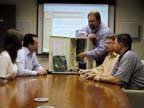
Photo Courtesy of Blue Ridge Security Systems Inc.
Steve Hunt, president of 4A International, Chicago, a security convergence company that specializes in offering physical security and IT convergence solutions, says that a coherent strategy aligning IT and physical security can equal cost savings and other business benefits.
Hunt, whose company is made up of a group of strategic consultants and investors, works on forming alliances with IT and hardware or software manufacturers. Hunt sees converging physical security and IT as a way to provide better tools and solutions for the security industry.
“There is just not very good technology out there to develop what the customer wants,†he says. And while Hunt does not think that the idea of dealer companies hiring IT staff has become a trend yet, he says a convergence is happening on a large scale among security manufacturers and IT companies.
Presently, however, security dealers may face challenges when interacting with IT staff from their customer companies. Yet, many security dealers and systems integrators have not yet integrated IT staff into their companies.
Blue Ridge Security Systems Inc., Anderson, S.C., began hiring IT personnel about three years ago, when the staff noticed a blurring line between physical security and IT in the alarm industry. Since then, the installation, service and monitoring company has added more IT staff to its ranks. The company, ranked as No. 67 on the SDM 100 with annual revenue of more than $6 million, currently has two IT individuals on the payroll.
With increased business and a niche market of customers in commercial and industrial sectors, Jim Lovinggood, general manager of Blue Ridge Security Systems, says the need for IT personnel at alarm companies is a significant – if not a new – need.

to hire IT staff?
LOVINGGOOD: So many of the products today, like access control products, are heavily software- and network-related – you find yourself getting on the client’s network and trying to talk in IT language. We felt it was time to have somebody on staff with that knowledge. What surprised me about [integrating IT staff into a physical security company] is that it was considered new, because the markets we are trying to address have a lot of IT management or departments, and out of necessity we felt the need to add IT people as much as three years ago.
SDM: You have mentioned that your IT staff helps the company out with networkable products. What do you mean by this?
LOVINGGOOD: There are two major products lines [our IT staff] helps with: access control on a networkable platform and video from the standpoint of networked IP cameras and internally tying them to networks and Internet-related products. So many video products have Internet capability and having the proper [network] addresses, setups and levels of passwords and security are important.
SDM: What job duties does your IT staff perform? Sales calls? Service calls? Demos?
LOVINGGOOD: All of the above. They get involved in some of the sales applications. We attempt to bring [our customers] to our location and we have demonstration equipment here. If we take it on the road we will often have our IT staff involved in those demonstrations as well.
We also use IT in terms of service. Security managers want to see the software and learn how to interface it, download video and look at access control bases. Our IT staff helps with the initial setup – our technicians do a good bit of it and [the IT staff] does larger, more sophisticated applications. Our IT staff works with the [customer company’s] IT manager to reassure him, for example, that we are not going to take up too much bandwidth. They also do a lot of training for both our staff and the end users. In the case of a plant or industrial application we might have two or three training sessions.
As far as service, they do a significant amount since so much of [our products are] software- or hardware- and computer-related.
SDM: Why did you hire IT professionals instead of, for example, educating your existing employees on IT information?
LOVINGGOOD: We had folks that we knew with a lot of knowledge and we had confidence in them. We do try to educate all our service technicians to play a big role in IT-related applications, but we need the IT people. We don’t expect [technicians] to become true IT experts. They can be our eyes and ears, but they might call with a question or to get additional information from our IT folks. I certainly don’t think the way we have done it is the only way – there are a lot of good technicians that could become great IT folks.
SDM: How hard was it to find IT people? Where did you recruit them from?
LOVINGGOOD: We had relationships with them as far having done some IT work with us in the past. The IT world has reached a point where there are an awful lot of people in [their industry] looking for other opportunities.
Quite frankly, from what I am seeing in this industry, the line between IT and security is getting fuzzier and fuzzier and the IT industry is looking at us very seriously. A lot of IT companies are finding this to be a competitive market to jump into. There are a lot of IT professionals that are becoming knowledgeable in security issues and the learning curve is not that hard.
SDM: Do you think your company’s gain in commercial customers this year added to the need for IT people?
LOVINGGOOD: Very much. It has definitely helped [our business] in so many ways. It’s hard to really measure the true value [our IT staff] brings to this because they affect almost every phase of our business.
SDM: Was it difficult to make up the salary difference between IT people and others in the security industry?
LOVINGGOOD: I guess we look at it as every employee you hire has a certain value to them. You have to have good people to have a successful company. I don’t know that they are much more expensive than our technicians, but markets do dictate and skills are commensurate with that pay. You have to get to the point where the value they bring in is equal to what you have to pay. They are valuable to us.
SDM: Do you see security companies hiring IT staff as a trend for the industry?
LOVINGGOOD: I would think so. We just got back from the ISC West show where I kept hearing, ‘You’d better get onboard. The IT revolution is here.’ When I heard the comments that not many people had [implemented IT staff] I was surprised. I’ve got to believe that this is where the industry is going. The products are becoming that way and service companies are following suit. You could argue they are already there.



